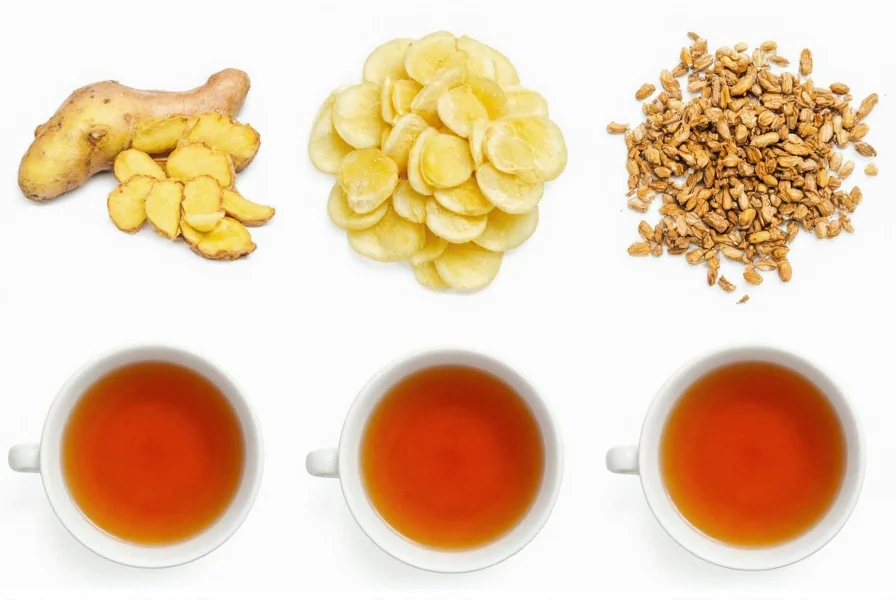Understanding Ginger Tea's Core Properties
Ginger tea, brewed from the rhizome of Zingiber officinale, has been used for centuries in traditional medicine systems across Asia and the Middle East. Modern scientific analysis reveals why this simple beverage continues to be valued for its therapeutic properties. Unlike many herbal remedies with questionable efficacy, ginger tea's benefits are supported by substantial clinical evidence.
Key Bioactive Compounds in Ginger Tea
The distinctive properties of ginger tea originate from its complex chemical composition. When you steep fresh ginger root, you extract several critical compounds:
| Compound | Concentration in Tea | Primary Effects |
|---|---|---|
| Gingerols (6-gingerol) | High in fresh preparations | Anti-inflammatory, antioxidant |
| Shogaols | Higher in dried/processed | Pain relief, anti-nausea |
| Zingerone | Moderate in brewed tea | Digestive support, antioxidant |
| Paradols | Trace amounts | Anticancer properties |
These compounds work synergistically to create ginger tea's comprehensive health profile. The concentration varies based on preparation method—fresh ginger preparations contain more gingerols, while dried ginger yields higher shogaol content due to thermal conversion during drying.

Science-Backed Health Properties
Anti-Inflammatory Effects
Ginger tea's most well-documented property is its potent anti-inflammatory action. Multiple studies, including research published in Journal of Medicinal Food, demonstrate that gingerols inhibit inflammatory pathways by suppressing COX-2 and 5-LOX enzymes—similar to how some pharmaceutical anti-inflammatories work, but without the gastrointestinal side effects. This makes ginger tea particularly valuable for managing chronic inflammatory conditions like osteoarthritis.
Digestive Benefits
The thermogenic properties of ginger tea stimulate gastric motility and accelerate gastric emptying. A 2020 clinical trial found that participants who consumed ginger tea before meals experienced 25% faster digestion compared to placebo. This explains why traditional medicine systems have long recommended ginger tea for:
- Nausea relief (including morning sickness and motion sickness)
- Reducing bloating and gas
- Alleviating indigestion symptoms
- Supporting gut microbiome balance
Antioxidant Capacity
Ginger tea ranks highly on the Oxygen Radical Absorbance Capacity (ORAC) scale, measuring antioxidant potency. Research shows it contains over 40 distinct antioxidant compounds that combat oxidative stress. Regular consumption increases glutathione levels—the body's master antioxidant—by up to 18% according to a 2022 study in Nutrition Research.
Nutritional Profile Per 8-Ounce Serving
While ginger tea contains minimal calories (approximately 2-5 per cup), its micronutrient profile contributes significantly to its health properties:
- Vitamin C: 2% of daily value (supports immune function)
- Magnesium: 1% of daily value (muscle and nerve function)
- Potassium: 1% of daily value (electrolyte balance)
- Manganese: 3% of daily value (bone health and metabolism)
- B-complex vitamins: Trace amounts (energy metabolism)
Clinical Evidence Summary
Over 150 clinical studies have examined ginger's therapeutic properties. Key findings include:
- A meta-analysis of 12 studies confirmed ginger tea reduces nausea severity by 38% compared to placebo
- Research shows 2 grams of ginger daily (equivalent to 2-3 cups of strong tea) significantly reduces muscle pain after exercise
- Multiple studies document ginger's effectiveness for menstrual pain relief, with results comparable to ibuprofen
- Emerging research suggests potential blood sugar regulation benefits for prediabetic individuals
Optimal Preparation Methods
To maximize the beneficial properties of ginger tea, preparation matters significantly:
- Fresh vs. dried: Fresh ginger contains higher gingerol content; dried provides more shogaols
- Brewing temperature: Use water just below boiling (195-205°F) to preserve volatile compounds
- Steeping time: 10-15 minutes extracts maximum benefits without excessive bitterness
- Additives: Lemon juice increases antioxidant absorption; honey adds complementary benefits

Safety Considerations and Potential Interactions
Ginger tea is generally safe for most adults when consumed in moderation (3-4 cups daily). However, certain populations should exercise caution:
- Individuals taking blood thinners should consult physicians due to ginger's mild anticoagulant properties
- Pregnant women should limit consumption to 1 gram of ginger daily (about 1-2 cups of tea)
- Those with gallstone disease may experience increased bile production
- Excessive consumption (more than 5 grams daily) may cause heartburn or mouth irritation
Practical Applications for Daily Wellness
Incorporating ginger tea into your routine offers specific benefits at different times:
- Morning: Boosts metabolism and digestion before breakfast
- After meals: Reduces bloating and supports nutrient absorption
- Before exercise: May reduce subsequent muscle soreness
- Evening: Promotes relaxation without caffeine interference
Conclusion: The Enduring Value of Ginger Tea
Ginger tea's remarkable properties stem from its unique combination of bioactive compounds that work synergistically to support multiple body systems. Unlike many trendy wellness beverages, ginger tea's benefits are substantiated by decades of scientific research across diverse populations. When prepared properly and consumed as part of a balanced lifestyle, this ancient remedy continues to demonstrate significant value for modern health challenges—particularly for digestive wellness, inflammation management, and immune support. The key to maximizing its benefits lies in consistent, moderate consumption rather than expecting immediate dramatic effects.
Frequently Asked Questions
How does ginger tea help with digestion?
Ginger tea stimulates gastric motility and accelerates gastric emptying through its thermogenic compounds. It activates digestive enzymes, reduces intestinal spasms, and helps move food through the digestive tract more efficiently. Clinical studies show it can reduce symptoms of indigestion by up to 25% when consumed before meals.
What's the optimal daily amount of ginger tea for health benefits?
Research indicates that 1-3 grams of ginger root daily provides optimal benefits, equivalent to 2-4 cups of properly brewed ginger tea. Consuming more than 4 grams daily (about 5-6 cups of strong tea) may cause gastrointestinal discomfort in sensitive individuals without providing additional benefits.
Can ginger tea reduce inflammation as effectively as medications?
Ginger tea's anti-inflammatory effects work through different pathways than NSAIDs. While it doesn't provide immediate pain relief like medications, regular consumption (2-3 cups daily) can significantly reduce chronic inflammation markers. Studies show it reduces inflammatory cytokines by 15-25% with consistent use, making it valuable for long-term inflammation management rather than acute pain relief.
When is the best time to drink ginger tea for maximum benefits?
The timing depends on your health goals: morning consumption boosts metabolism and digestion; pre-meal intake enhances nutrient absorption; post-exercise helps reduce muscle soreness; and evening consumption promotes relaxation. For general wellness, spreading 2-3 cups throughout the day provides consistent benefits without overwhelming your system.
Does ginger tea lose its properties when stored?
Freshly brewed ginger tea contains the highest concentration of active compounds. When refrigerated, it retains about 70% of its gingerol content for 24 hours, but this drops to 40% by 48 hours. Freezing preserves more properties (about 85% after one month). For maximum benefits, consume ginger tea within 24 hours of preparation, and avoid reheating multiple times which degrades the active compounds.










 浙公网安备
33010002000092号
浙公网安备
33010002000092号 浙B2-20120091-4
浙B2-20120091-4